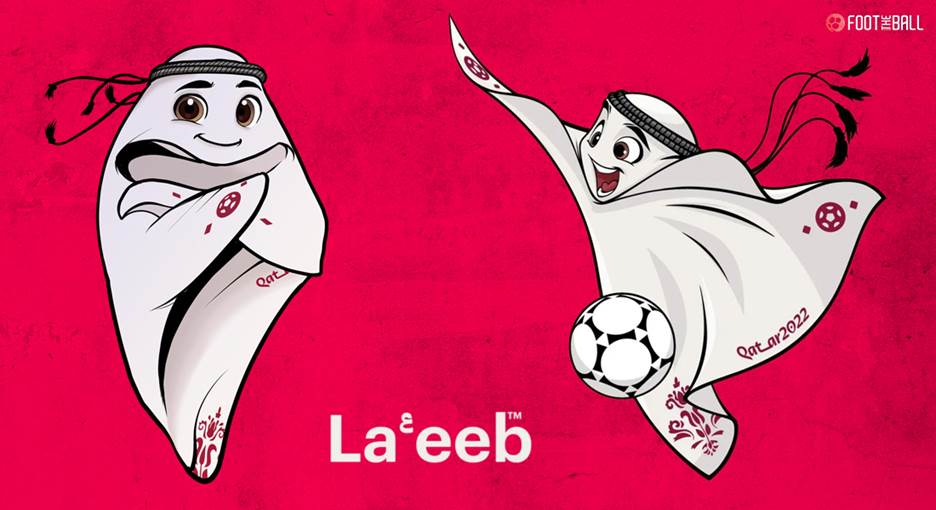
The official mascot of the world cup, Labeeb, a skilled athlete – FootTheBall
The World Should Respect Qatar's Values during FIFA World Cup
By Dr Aslam Abdullah
CA

Sixty-five percent of the world's population will watch 32 nations compete in Qatar's most prestigious football cup. With a population of 2.6 million, including 800,000 Qataris, the country is about 1.25 times larger than Cyprus and Puerto Rico. Most visitors are from the USA, Saudi Arabia, England, Mexico, United Arab Emirates, Argentina, France, Brazil, and Germany. The 1.2 million will stay in over 100 hotels. The teams will play at eight different stadiums, including Al Bayt Stadium, Lusail Stadium, Ahmad Bin Ali Stadium, Al Janoub Stadium, Al Thumama Stadium, Education City Stadium, Khalifa International Stadium, and Stadium 974.
Qatar spent 220 billion in the last 12 years to prepare for this competition, the first of its kind in a Muslim-majority country. However, the Qatari culture and its Muslim values have come under strict scrutiny from liberals and conservatives.
Do the conservatives ask if they can freely consume alcohol? While the liberals ask if gay couples will be allowed to attend matches. Should women dress modestly?
Qatar has strict laws about drinking, drugs, dress, and sexual conduct.
Its laws allow particular points of sale for alcoholic beverages and allocate spaces for fans to sober up in case of overindulgence.
In general, Qatar permits the sale and consumption of alcohol to people over 21 years old at hotels, restaurants, and bars that hold a permit but not in the streets or other public places. However, being drunk in public is a crime punishable by Qatari law.
Qatar prohibits smoking in all public places, including museums, sports clubs, shopping malls, and restaurants.
Qatar punishes sexual relations between same-sex people with imprisonment of one to three years; its penal code states that "leading, instigating or seducing a male in any way to commit sodomy or dissipation" is a crime. However, Qatar will also display the rainbow flag.
The Qatari penal code also criminalizes extramarital affairs.
In its official Qatar 2022 Fan Guide, FIFA does not mention women required to wear the traditional Islamic head covering.
The only reference to the dress code in the 76-page document is: "Think about what you're going to wear on match day! Pack your costumes, team shirts, and flags, but make sure you know the rules before heading to the stadiums." It recommends that men and women ensure their shoulders and knees are covered.
Qatar is an independent sovereign country deeply rooted in culture, traditions, and religious values. Therefore, it has every right to follow its laws and rules. No country allows foreigners to violate its laws and regulations. For example, the UK does not permit American tourists to drive on the right side. Adultery is a crime in the Philippines; the law differentiates based on the gender of the spouse.
In the Americas, the following countries restrict LGBT rights: Barbados, Dominica, Grenada (male only), Guyana (male only), Jamaica (male only), St Kitts and Nevis (male only), St Lucia, St Vincent, and the Grenadines.
In Africa, the following countries have laws restricting LGBT: Algeria, Burundi, Cameroon, Chad, Comoros, Egypt (de facto criminalization), Eritrea, Ethiopia, The Gambia, Ghana, Guinea, Kenya (male-only), Liberia, Libya, Malawi, Mauritania, Mauritius (male only), Morocco, Namibia (male only), Nigeria, Senegal, Sierra Leone (male only), Somalia, South Sudan, Sudan, Swaziland (male only), Tanzania, Togo (male only), Tunisia, Uganda, Zambia, and Zimbabwe (male only).
In Hungary and some areas of Poland, laws restricting LGBT activities exist.
In Asia, the Middle East, and Oceania, the following countries have strict laws against LGBT: Afghanistan, Bangladesh (male only), Bhutan (male only), Brunei (male only), Indonesia (in some areas), Iran, Iraq (de facto), Kuwait (male only), Lebanon (male only), Malaysia, Maldives, Myanmar (male only), Oman, Pakistan (male only), Qatar, Saudi Arabia, Singapore (male only), Sri Lanka, Syria, Turkmenistan (male only), United Arab Emirates, Uzbekistan (male only), Yemen
In Oceania: Cook Islands (male only), Kiribati (male only), Papua New Guinea (male only), Samoa (male only), Solomon Islands, Tonga (male only), and Tuvalu (male only)
Many nations competing in the World Cup have laws restricting LGBT rights. Therefore, it is hypocritical on the part of the world to ask Qatar to change its statutes while allowing other countries with similar rules to compete. The world needs to respect those who do not view sexual orientation as a matter of public display. Sex in many cultures is within the context of a man and woman married under the law. Those with an alternative viewpoint should not expect the world to follow their dictates. If they want to live their lifestyle, they need not impose it on others. Similarly, those who dislike this lifestyle should not show a homophobic attitude.
However, people should realize that the World Cup is not an event to show one's sexual orientation. Instead, it is a competition to prove one's skills and stamina in one of the most rigorous sports.
(Dr Aslam Abdullah is a resident scholar at Islamicity.org and editor-in-chief of the Muslim Observer newspaper. He is also the Indian Islamic Heritage Project director of the American Federation of Muslims of Indian origin and the interim President of the World Council of Muslims for Interfaith Relations, WCMIR.)

